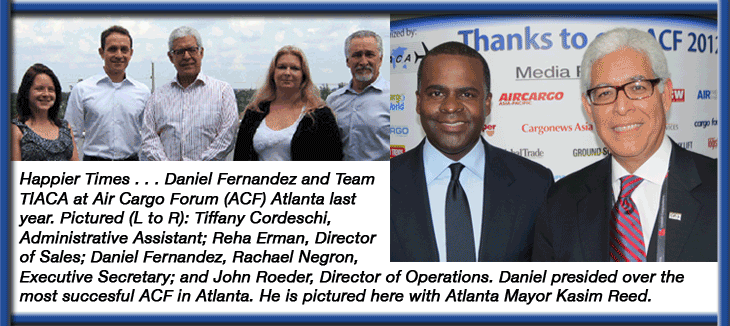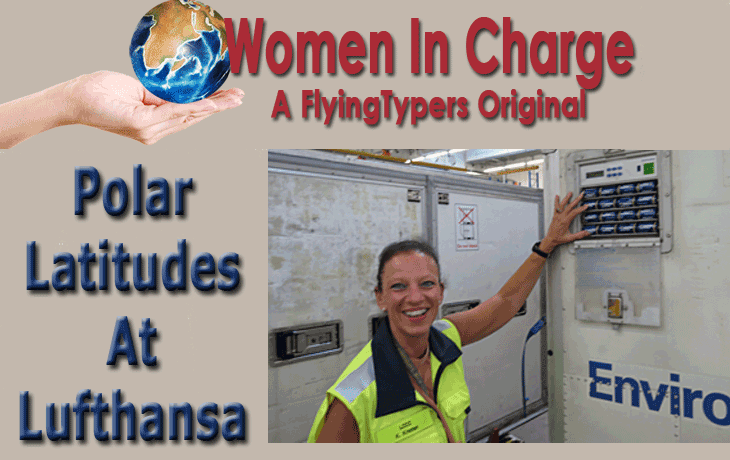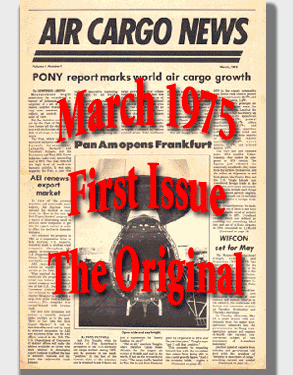
 hen
word came that Daniel Fernandez, long time stalwart Secretary General,
suddenly and without any warning departed from his post at The International
Air Cargo Association (TIACA) on August 2, it should have set off some
alarm bells that something drastic was afoot with that organization. hen
word came that Daniel Fernandez, long time stalwart Secretary General,
suddenly and without any warning departed from his post at The International
Air Cargo Association (TIACA) on August 2, it should have set off some
alarm bells that something drastic was afoot with that organization.
After all, Daniel had been an integral and vital element in the development
of TIACA from a mostly well meaning, albeit disorganized trade group
in November 1999 to its current stance of fattened coffers, and an ongoing
steamroller of industry trade shows in different international gateway
cities every two years.

Fernandez is not talking, but it is commonly
believed that TIACA (to put it bluntly) screwed a very nice,
well-liked, and decent guy.
The word is that not only was Daniel summarily
relieved of command, but he was also replaced by an ex-U.S. government
employee of the U.S. Transport Security Administration (TSA), Doug Brittin.
Brittin seems like a nice enough guy,
at least; he’s been out on the rubber chicken circuit for the
past half dozen years talking up mandated security deadlines in simple,
understated tones.
Brittin apparently got upped from government
to the private sector after taking the heat of delivering mandates to
air cargo, utilizing the very effective ‘fist in a velvet glove’
technique.
How Brittin, apparently with no background
for operating a large international air cargo industry trade group,
fits into TIACA remains to be seen.
For certain, TIACA desperately needs continuation
of the organizational and money-making skills that Fernandez delivered,
and which made the group rich at trade shows and events during the past
dozen or so years.
The current shutdown of the U.S. government
over politics and money issues underscores dramatically the notion that
often government success may not necessarily be suitable training for
delivering a private sector business enterprise, let alone a vital,
mandated trade group such as TIACA.
Reaction to all of this is coming in from
several quarters.
Michael Webber, a well-respected aviation
and airport expert who, among other things, stood up and stopped the
St. Louis Lambert Field Aerotropolis scheme a few years back, definitely
has a few things to say.
Here he wonders why Daniel Fernandez was
so unceremoniously thrown under the bus by TIACA.
"I was the head of marketing for
the Aviation Department in Kansas City and a Trustee of TIACA when Daniel's
predecessor Garth Davies was at the helm as TIACA Secretary General.
“I remember thinking at the time
that for as much as we were paying for that distinction, TIACA seemed
like a needlessly clubby organization.
"Garth reminded me of that Dana Carvey
maître d’ character from Saturday Night Live who delighted
in consigning would-be patrons to various areas of the lobby based on
their perceived importance. "Comparatively
speaking, Daniel flattened the hierarchy and specifically brought airports
up to something approaching parity with other members of the association—a
sea change from when they were expected to be seen and not heard.
“One of my successors in KC (Gary
Bartek) eventually became the TIACA chairman.
“One can only wonder that if by
treating everyone as equals, Daniel didn't ruffle the feathers of anyone
who expected to be treated as something more special?
“I'm not even a member of TIACA
anymore, but I respect the organization and appreciate the opportunity
to participate in their events and don't question their authority to
make changes they deem necessary.
“If there were an opening for the
Secretary General position, I would think Doug Brittin was a great hire
by every measure.
“Having observed excruciating cuts
throughout, our industry is perhaps more accustomed to unpleasant decisions
than most, although most of those cuts fell sharpest below the organizational
levels of the executives.
“Perhaps for the rest of us, there's
simply an expectation that if peoples’ lives must be so disrupted,
it should be done in as decent and dignified a manner as reasonable.
“To remain effective, trade associations
have to rely heavily on the good will of their industries. If I'm out
of step with the times, so be it, but I'd like to think that a thoroughly
decent guy would be treated with the same dignity with which he served.”
 |

Sources say Fernandez may be forced into
some kind of legal action just to get TIACA to honor its commitments
to its ousted former Secretary General.

If the Fernandez scenario were not enough,
now comes word that the great Issa Baluch has quit his position on TIACA’s
Board and is “very unhappy with the direction the organization
is taking in 2013.”
We reached Issa just as he was disembarking
an airplane in Dubai earlier this week.
Always outspoken, Issa lays it on the
line, saying:
“I am a firm believer in change
and am open to change in any organization, but it must be change that
benefits the entire organization, not just a select few.
“The reason for my resignation actually
relates to what I just said about change.
“In the last few years, TIACA’s
traditional culture was broken by a few in that group who recruited
a vice chairman from outside the members of the board.
“The rationale presented was that
the current chairman preferred a vice chairman that he personally knew
well and who he could be sure would carry out the chairman’s agenda.
“This became the most important
objective in electing officers.
“Current board members were not
considered for office because they were not personal friends of the
chairman.
“This cycle has repeated through
the last three elections of officers.
“Only with the last one of these
three was any effort made to stop the practice, but it is too little
too late.
“A cosmetic change in the bylaws
was made but the door to external nomination is still wide open.
“TIACA’s long tradition of
collaboration, open debate, and consensus building has been replaced
with a private sector, top down control of that association.
“I have had some 30 years of experience
serving on the board of various trade associations.
“One volunteers for these positions
to advance and serve the interests of a particular industry as a whole,
rather than for narrow self-interest and private agendas. So care should
be taken as to those who are given office to insure that the organization’s
culture and broad objectives continue.
“Sadly, TIACA’s leadership
during the past few years has continued the focus on their own narrow
interests rather than the interests of the membership as a whole.
“The assets of the many, earned
over many years, are now appropriated to fund the agenda of the few.”

“The biggest part of TIACA’s
membership and area of growth are the SMEs, but board and officer recruitment
efforts have focused solely on large multinationals to the exclusion
of everyone else.
“In my mind, it is crucial that
the board be representative of the entire industry and TIACA’s
wide membership, as it has traditionally been.
“TIACA’s diversity is what
gave it its unique role and credibility as the true representative of
the air cargo industry.
“I remained on the board to advocate
this view until the point that I found I could no longer prevail against
this current tide of large corporate interests and lack of diversity,”
Issa Baluch said.
Geoffrey
|










